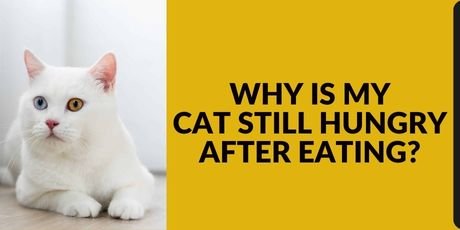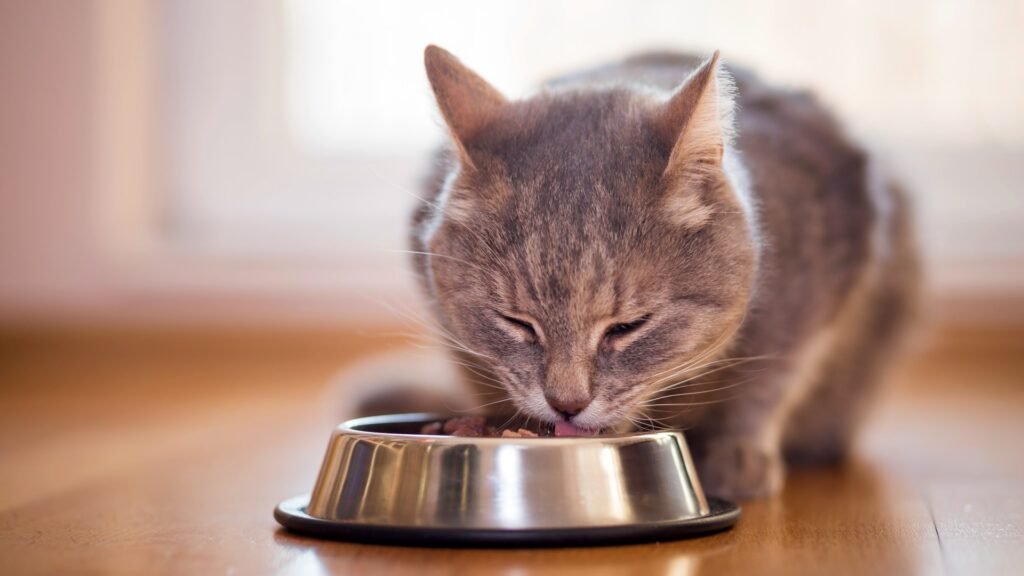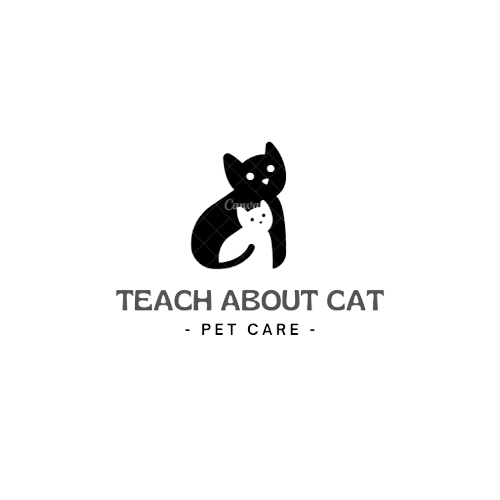As a pet parent, one question that often puzzles us is, “Why is my cat still hungry after eating?” Understanding the reasons behind this seemingly perpetual hunger can be a bit of a balancing act, but it’s essential to get right for their happy and healthy life.
Have you ever noticed your cat begging for more right after dinner? It’s not just a cute habit; it could be a sign of an underlying issue. Whether it’s a matter of lifestyle or a medical condition, it’s important to identify what’s causing this hunger. Could they be always hungry because you’re not giving them enough, or is it a matter of them wanting to eat so much that they might grow fat?
Delivering a tasty, yet nutritious diet, is key. As someone who’s always trying to keep my whiskered family members content, I’ve learned that balance is crucial. Are they getting enough to eat and play, or are they consuming too much? It’s a balancing act that we, as pet owners, must master.
Remember, not doing anything about this can lead to health issues. So, as responsible pet parents, it’s our duty to tackle these dietary challenges head-on for the wellbeing of our furry companions.
Reasons Why Your Cat May Always Be Hungry
Observing a cat that is always hungry, whether acting hungry or sounding hungry, is not something to assume as purely an appetite issue. From my own experience with my fully grown cat, who seemed to never get full, I learned that this behavior isn’t exclusive to kittens and young cats who are growing. Indeed, a kitten’s stomach might demand constant refilling to keep strong and grow, but there’s no such thing as being too hungry in every life stage.
When an adult cat starts eating more than usual, it’s crucial to consider a few reasons. It could be a phase of their growth, or there might be an underlying health issue. As someone who’s been dealing with cats for years, I understand the importance of closely monitoring their diet and behavior. It’s about ensuring they receive the right amount of cat food for their specific needs. This awareness helps in keeping our always hungry feline friends both happy and healthy.

Boredom
Boredom in cats can mirror the habits we see in humans: they might eat when there’s nothing else to do. To alleviate boredom, try offering your cat more than just a little snack. It’s a test of creativity – playing games, providing toys, and giving them various things to do can divert their attention from constant eating. Just like humans, cats need mental stimulation, and play is a fantastic way to provide this.
Low-Quality Diet
A low-quality diet can be deceiving; your cat might consume plenty of volume but get not enough nutrition. Their systems start needing more, which can manifest as hunger. When feeding your feline friend, it’s important to ensure they’re getting a ‘complete’ food. A mixture of wet foods and dry foods often constitutes a more complete diet. This balance is crucial to prevent them from feeling perpetually hungry due to a lack of essential nutrients.
Parasites
Parasites, like roundworms and tapeworms, can be a hidden cause of permanent hunger in cats. As unpleasant as it is to think about, these critters are not nice, leading to various medical complications. Vets often recommend worming tablets to keep your cat free from these parasites. It’s crucial to ensure their worming schedule is up to date to prevent such issues.
Medical Condition
Certain medical conditions, including cancer, hyperthyroidism, diabetes, inflammatory bowel disease (IBD), and exocrine pancreatic insufficiency (EPI), may cause your cat to eat more than usual. If you observe such changes, it’s vital to speak with your vet for advice on the best way to tackle these health issues. Early intervention can make a significant difference in managing these conditions.
Age
As with us, aging in cats does not show as it does in humans, but they certainly feel the effects. Some older cats might eat more as they age to combat muscle wastage, while others won’t. If your older cat is pestering for more food, it could be a sign of their body’s changing needs with age.
Also Read: Medical Grooming for Cats
What to Do If You’re Cat is Always Hungry?
When your cat is eating more than usual, it’s crucial to consider other things beyond just filling their bowl. I’ve offered various tips over the years to friends facing this issue. Sometimes, a change in routine or a new type of enrichment can make a significant difference in their eating habits.
Find the Root Cause
Finding the root cause of why your cat is always hungry is key. It might be as simple as needing more play time, or it could be something more serious. Try simple things first. Stimulate your cat by playing, or buying a different brand of food. Ensure you feed them a complete food, and that their worming tablets are up to date. If these approaches don’t work, it’s time to think about a visit to the vet.
Visit the Vet
While vet visits can cost money, the price is worth it to keep your family member safe and well. A vet knows what to look for and can provide reassurance or suggest the necessary treatment your feline friend needs. It’s essential not to skip these visits, especially when changes in appetite occur.
Change Feeding Times
If there’s nothing wrong with your cat but they are eating more than usual, consider changing their feeding times. Instead of one or two larger meals, you might split their daily intake into three to four smaller meals. Cats are natural grazers, and this approach can help satisfy their hunger without risking overfeeding.
Change to a Better Nutritionally Balanced Diet
Cats have diverse and specific nutritional needs, unlike humans. They need high levels of protein and can’t thrive on a vegetarian diet or a vegan diet. When feeding your cat, ensure they’re receiving a complete food that provides a full range of nutrients. Your cat will let you know if they don’t like their new diet, but it’s essential for their overall health.
Change Feeding Methods
In a situation where a skinny cat is always hungry and possibly not getting their fair share – a common scenario in multi-cat households – consider changing your feeding methods. For instance, if one cat is a raider, a simple way to manage this is using a MiBowl Automatic Microchip Pet Feeder. This device automatically detects your pet’s individual microchip, giving unique access and allowing you to schedule meals suitable for both wet food and dry food. It’s especially useful for pets on regulated diets or prescription diets, and for keeping a meal raider from accessing the ‘authorised’ cat’s food. The feeder won’t dispense food for anyone else, ensuring a simple and fair feeding solution for your family.
Why is My Cat Eating So Much?
There are lots of reasons why your cat might be eating so much. If they seem extra hungry, it could be because they are not getting the nutrients they need from their current food. The good news is that by listening to your feline and watching their habits, you can start experimenting to identify the cause and do something about it. If you have a particularly skinny cat and you suspect something more is at play, don’t hesitate to take them to the vet. It’s better to be safe than sorry, and you can never be too careful when it comes to their health.
Why is My Cat Always Hungry?
Cats are natural grazers, often preferring to snack throughout their waking hours. If your cat consistently finishes meals and immediately asks for more, it could indicate a problem. This behavior might stem from boredom or even medical causes, such as needing more calories. Commercially available foods have different caloric contents, and the guide on the food container might not match your cat’s different metabolism. It’s wise to ask your veterinarian for guidance in determining your cat’s ideal body weight. Your vet might suggest to adjust your cat’s meal plan to safely help them reach and maintain their target weight. In some cases, your veterinarian may even recommend switching to different cat food options that help your cat feel full and satisfied between meals.
Also Read: Cat Dropping Food When Eating
Cat Hungry All the Time? Medical Causes of Increased Appetite
If your cat is always hungry and never reaches satiety, it’s vital to have a vet examine them for an underlying medical concern. Some of the medical causes for increased appetite in cats include:
- Hyperthyroidism: This condition involves an excess of circulating thyroid hormones. Weight loss despite an increased appetite is a classic sign of this hormonal disease.
- Diabetes mellitus: Often referred to as sugar diabetes, it is characterized by a strong appetite while simultaneously losing weight, along with increased water consumption and urination.
- Cancer: While a nonspecific diagnosis, increased appetite can be a symptom. Systemic cancers and intestinal cancers particularly can increase caloric needs, yet the cat may not appear to put on weight.
Is a Hungry Cat Always a Cause for Concern?
A hungry cat is not always a cause for alarm. Each cat has a unique ideal weight, and the number of calories needed to achieve and maintain this weight can rise and fall throughout their lifespan. It’s easy for cats to gain weight as they age and their activity levels fall. They might temporarily protest when their food is adjusted to an appropriate amount, but this protesting is different from a nonstop appetite. An insatiable, abrupt change in your cat’s appetite should indicate a potential underlying problem and warrants a visit to the vet for a thorough check-up.
Reasons for Increased Appetite in Cats
There are various reasons why a cat might be always hungry. These can range from simple dietary imbalances to more complex health issues. It’s important to identify these reasons, as they often need to be treated medically. In such cases, it’s advisable to go to the vet for a thorough check-up and appropriate intervention.
Malabsorptive Diseases
Malabsorptive diseases like Inflammatory bowel disease (IBD) and intestinal neoplasia affect the small intestines’ ability to properly absorb the nutrients from the food a cat ingests. This can lead to weight loss, muscle wasting, and paradoxically, an increased appetite. Symptoms may also include vomiting, diarrhea, and pica (eating non-food items). Another condition, exocrine pancreatic insufficiency (EPI), occurs when the pancreas does not produce an appropriate amount of enzymes to break down food, thus thwarting the body’s ability to absorb the food’s nutrients.
Diagnosing these conditions requires a comprehensive approach. Bloodwork, urine testing, and abdominal imaging are crucial to diagnose small intestinal malabsorption diseases. The treatment largely depends on the specific diagnosis. Diet changes to more easily digestible, hypoallergenic, or novel protein diets can help, as can supplements like probiotics and vitamin B12 (cobalamin). In some cases, oral steroids, chemotherapy, or digestive enzymes are recommended to address the underlying condition and alleviate hunger issues.

Should You Go to the Vet if Your Cat Is Always Hungry?
If you notice that your cat is persistently hungry over a period of 5-7 days, it’s important to schedule a visit with your veterinarian. Persistent hunger can be a sign of underlying health issues that need professional assessment and treatment.
- Vomiting
- Diarrhea
- Weight loss
- Frequent vocalizing
- Worms in the stool
- Increased thirst
- Increased urination
- Lethargy
- Episodes of not eating
- Suddenly eating non-food items
How Vets Find the Cause for Increased Appetite in Cats?
Testing, include
- Full blood work and urine testing are conducted to assess the liver, kidney, thyroid, electrolyte levels, as well as red and white blood cells. These tests provide a comprehensive overview of the cat’s general health and can highlight any abnormalities.
- Fecal testing is crucial for detecting intestinal parasites, which can cause increased hunger if they are absorbing the nutrients meant for the cat.
- Abdominal imaging, including x-rays and ultrasound, focuses on the gastrointestinal system. This helps in identifying any physical anomalies or diseases affecting this area. In some cases, a specific blood test known as a gastrointestinal panel is recommended to inspect for small intestinal malabsorptive diseases.
Also Read: Why Do Cats Like Fish?
How to Stop Cats from Being Hungry All The Time?
-
Offer him good quality food.
When it comes to preventing your cat from being always hungry, the first step is to offer food in sufficient quantity that’s rich in healthy essential nutrients. Good quality, highly digestible food ensures a large proportion of the nutrients are digested and absorbed by the animal. If these criteria are not respected, a cat may remain always hungry, despite eating regularly. Many cat foods on the market make it difficult to identify good quality ones. Hence, it’s crucial to read the label on the bag for information about the quality and content.
-
Offer him several small meals during the day.
To keep your cat less hungry between meals, consider dividing their daily portion of food into several small meals, ideally 3 to 5 times a day. This helps keep the level of nutrients and energy in their blood more stable for longer periods, compared to when a cat eats a lot at once.
-
Use a kibble vending machine.
Using a kibble vending machine, or a distributor of controlled portions of food at pre-programmed time intervals, can be convenient especially when you’re away from home for long periods each day. This ensures your cat doesn’t have to wait for you to come back to eat.
-
Offer a prescription food designed to trigger satiety or to lose weight.
For cats that eat good quality food but are still hungry, a suitable option is prescription food designed to trigger satiety or aid in weight loss. These foods often contain fibers that swell upon contact with water in the stomach, taking up space and making cats feel full with smaller amounts of food.
-
Add dietary fiber to the food.
Adding dietary fiber like Regular Metamucil (with no added flavors or additives) to your cat’s food can help. About ½ teaspoon once or twice a day can appease their hunger. Ensure the stools are not too dry and the cat drinks enough water and stays well hydrated. Metamucil can change the stool’s texture, helping to soften it and become larger.
-
Put food in a food toy.
Food toys are especially beneficial for glutton cats, as they fill hunger while slowing down the food intake. This can not only help with your cat’s behavior but also stimulate their intellect and mimic hunting, preventing the development of behavioral problems due to boredom.
-
If you have several cats, feed them separately.
In multi-cat households, it can be difficult to control the portions for each cat if they all eat from the same bowl. If a glutton cat is present, they may gain weight by eating not just their portion but also the portion of others. These cats often rush their food and finish before the others have a chance. A solution is to put them in a separate room to feed. For cats with difficulty jumping, you can place their bowls on the ground, while keeping other cats’ bowls higher up, like on a counter or a small table.
-
Use a micro chipped food dispenser.
Micro chipped food dispensers are advanced food bowls with an airtight lid that only opens when a cat with the corresponding microchip approaches the bowl. This technology is incredibly useful for preventing certain cats from stealing food from others. It is particularly used for a cat suffering from a medical condition that requires them to eat particular food.
Why is it Better for Cats to Eat Small Meals Often?
Cats, being strict carnivores, have a diet in the wild where they hunt for about 8 to 12 hours a day, typically consuming 10 to 15 prey items. Their digestive system is designed to digest small amounts of food frequently. This natural eating pattern is why indoor cats benefit from the opportunity to nibble throughout the day. Glutton cats that eat a lot and very quickly are going against this natural way of feeding, which can lead to digestive issues and overeating.
Also Read: What Human Foods Can Cats Eat?
Conclusion
Understanding the unique dietary habits and needs of cats is crucial for their overall well-being. Recognizing that their natural inclination is towards small, frequent meals rather than large portions at once can significantly impact their health and happiness. The consideration of various factors, from the type of food and feeding methods to addressing potential medical issues, all play a role in ensuring our feline friends are not only nourished but also content. By adopting strategies that align with their natural behaviors and consulting with veterinarians when necessary, we can provide our beloved cats with a life that is both healthy and satisfying.







